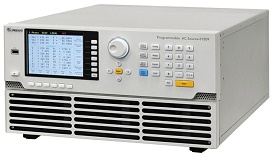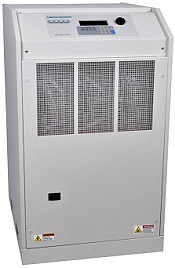Axiom Test Equipment Blog:
|

Press Release Archives: 2024 | 2023 | 2022 | 2021 |2020 2019 | 2018 | 2017 | 2016 | 2015 2014 | 2013 | 2012 | 2011 | 2010 2009 | 2008 | 2007 | 2006 | 2005 Content is copyright of company represented. Page format, custom text and images are RF Cafe copyright - do not distribute.
December 1, 2023 - Vista, California - Axiom Test Equipment, an electronic test equipment rental and sales company has published a new blog post that covers how to find the right AC Power Supply with enough output power for each component, device, and system during testing. While precisely controlled AC electricity may not be needed when testing DUTs powered by DC power, an AC supply can help simulate real-world operating conditions. For certain DUTs, such as electric motors, a well-controlled AC power supply can mimic the conditions in which the DUT will operate, including power supply line fluctuations, peaks, and surges. AC power supplies can be compared by electrical capabilities, such as maximum root-mean-square (RMS) voltage, maximum RMS current, maximum frequency, and maximum power in volts-amperes (VA) at a given frequency. They can also be considered by physical attributes, such as the size and weight needed to fit an application. This is a glimpse of several AC power supplies having sufficient output power for feeding a wide range of DUTs, including electric motors. Learn more about how these supplies combine generous power capabilities by reading the full blog post on Axiom's website: https://www.axiomtest.com/blog/How-Much-Power-Is-Enough-When-Selecting-an-AC-Supply/
Whatever your project requires testing of, rent or buy quality test equipment from Axiom Test Equipment. For over 15 years Axiom Test Equipment has rented, sold, repaired and accepted trade-in of test equipment to support your test & measurement needs. If you would like help selecting any type of test equipment for your next project, contact Axiom Test Equipment's sales department at sales@axiomtest.com, call 760-806-6600, or browse Axiom Test Equipment's inventory online at www.axiomtest.com.
About Axiom Test Equipment
Established in 2005, Axiom Test Equipment strives to continually improve itself and offer the best value for its customers. We offer our customers several practical, efficient and cost effective solutions for their business or projects' test equipment needs. Whether you need to rent & buy test equipment, repair test equipment, sell or trade equipment, we are committed to providing superior customer service and high quality electronic test equipment. At Axiom Test Equipment we provide several services. We rent electronic test and measurement equipment. We also sell test equipment. If you have a piece of malfunctioning or broken test equipment we also have an in-house repair lab. For anyone seeking a way to offload their surplus or obsolete equipment, we offer a trade-in program or we can buy the equipment from you. We stock a comprehensive inventory of equipment and can use our extensive network to find you those hard to get items. We believe in getting equipment to you quickly and at a competitive price.
Contacts Fabian Garcia Web: www.axiomtest.com E-Mail: fgarcia@axiomtest.com
Posted December 4, 2023 |



 Get Exactly What You Need. Rent - Buy
- Repair - Trade-In
Get Exactly What You Need. Rent - Buy
- Repair - Trade-In